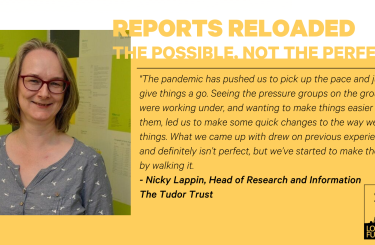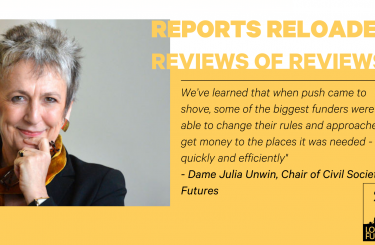Related


Reading back through IVAR’s report for London Funders, ‘The possible, not the perfect: Learning from funder responses to emergencies’, in the midst of the ongoing COVID-19 crisis, the urgency of the situation faced by communities, the not-for-profit sector and funders feels very raw. Now, more so than ever (and yes we all say ‘now more than ever’ more often than we should – but in my 20 years working with charities I’ve never seen the sector as it is now, and the impact it is having on our leaders, teams and most importantly communities), we need to take the learning from the emergencies of 2017, to ensure we are doing the very best we can at collaborating.
As I read it, I’m reminded of the criticality of the non-profit sector. The report highlights the work of 42nd Street who were able to respond swiftly to the impacts of the Manchester Arena bombing on young people – precisely because of their expertise, both on mental health and trauma, but also on Manchester itself. Whether we are responding to particular emergencies or ongoing entrenched inequality – I’ve seen first-hand the impact that the not-for-profit sector can have, if it is listened to, brought into the conversation, and then backed.
Funding, from both trusts and foundations and from the public sector, can still be uncertain, short-term and not focused on actual need on the ground
In the city of Manchester and Greater Manchester, we’ve seen increased efforts over the last 18 months to collaborate on funding, knowing that the learning from the IVAR/London Funders report demonstrated, quite explicitly, that this meant greater outcomes for funded organisations and therefore for communities.
We’ve seen the practice illustrated in 'the Possible, not the Perfect’ report explicitly inform what funders have done during COVID-19, with London Funders setting out a very clear position on the approach that funders should take – Young Manchester, and a number of other local funders, signed up to the London Funders statement, which then informed our practice throughout the pandemic (and still does).
Despite the learning from the events in 2017, the challenges that IVAR outline in their report, and the recommendations they propose, are still very much live issues for not-for-profit organisations, in Manchester and more widely. Funding, from both trusts and foundations and from the public sector, can still be uncertain, short-term and not focused on actual need on the ground.
In the city of Manchester and Greater Manchester, we’ve seen increased efforts over the last 18 months to collaborate on funding that means greater outcomes for funded organisations and therefore for communities
We’ve seen incredible support from a range of funders during COVID-19, locally and nationally – though we still hear from charities asking us “When are funders going to stop being nice again and go back to how they were?”.
The short and easy answer is that they won’t – and many were on that journey anyway. However, returning to the recommendations from IVAR in 2017 provides a really valuable framework to ensure we maintain the collaborative approach taken during the last two years including:
Doing it, together, is the challenge – and that is where we can all learn from the approach taken by London Funders.
In Manchester, we haven’t seen partnerships and collective investment on the scale of those supported by London Funders during the pandemic, but we have seen a greater desire for collaboration that directly meets the needs of communities and the VCSE sector, including on mental health, racial justice and sector infrastructure.
Whilst I’m no fan of hubristic ‘Manchester is the greatest place on earth’ narratives, we should be cautiously proud of the progress made on collaboration – but there is a lot more to do, and much that can be learnt from the model established by London Funders. Key for me is the role of infrastructure in supporting collaboration – as seen in the work undertaken to support children and young people following the Grenfell Tower fire, which led to the creation of our sister organisation Young Kensington and Chelsea.
This requires investment - we cannot continue to talk about collective impact and not fund the backbone. That backbone also needs to be independent - the independent role that London Funders is able to play feels critical to me, and one that should be adopted in other places including Manchester and Greater Manchester. An independent body, with funders themselves at its heart, provides the right platform to respond and act quickly when crises hit.
So I’m not going to declare that London is setting the way (we do things differently here, you might have heard), but we have a lot to learn from London Funders, and from their members, in how we can all focus on the needs of communities first, and ensure those needs are always put first.

